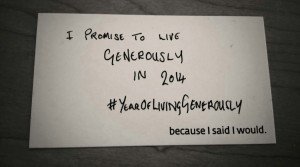Someone, let’s call her Sally, once said to me: “Andrew, it’s your mind that’s the problem; you think too much”.
I’ve never forgotten that. Not just because it seemed like a really stupid thing to say (who wants to live in ignorance?), but because there was an element of truth in it.
Sally was wrong in her meaning and the context, but the truth is, my mind – more specifically, my brain – is a problem.
It’s not that I think too much – sometimes I try not to think at all. Actually, thinking is very much affected by the functioning of my brain. On a good day, my thoughts will be clear, rational, and likely to do me very little harm. On a bad day, my thoughts will be clear, rational and likely to do me a lot of harm. You see, mental illness is not about how much or how little we think. It is about the conclusions that our brain suggests as a result of the thought processes within it.
Sally’s comment was made publicly in the context of a religious meeting. We’d been discussing our Christian lives, and I happened to say that I often struggled with doubt and feelings of self-loathing. I wasn’t able to consistently believe in a God who cared about me, or the rest of the world, yet wouldn’t help me to deal with the mental health issues I struggled with. I shared it with the aim to try to help others who I was sure might have experienced the same. I went on to say that I choose to believe, as I hope that God will one day help my unbelief.
I had been, since my late teens, taking medication to control severe clinical depression, and any time this was brought up in a church context, someone would inevitably offer to pray about it, or would offer some religiously based advice, but always with the implication that the fault was with me. At times, there would be a suggestion that ‘sin’ in my life was the root cause of the depression, and that if only I would ‘get right with God’, then it would all clear up. Please, bear in mind that I was devout since a young age, I was in a leadership position within my church, I spent more time reading and studying the bible than almost anyone I knew, and I spent a lot of my time being involved with the church and serving however I could.
I was not a ‘nominal’ Christian, I was a fully fledged, born again, bible believing, servant of the Lord. More than that, I desperately wanted to believe, not only to believe, but truly experience God for myself. That I could not only made my life more hellish, and I truly believed the problems were with me, and with me alone. That I could not reconcile my belief with my inner thoughts, desires and experience was beyond awful, and yet all these other Christians seemed to be living wonderful lives of peace, joy and harmony.
Eventually I left the church, not wishing to be a hypocrite. I had to first admit that I simply did not believe, and then act on that disbelief. I couldn’t stay in a leadership position and claim those beliefs. That meant I lost, quite literally, all of my friends. I eventually let my family know too. That, to this day, still causes me stress and grief. Some of my relatives live in a very cloistered bubble of evangelical Christianity, and I (and my siblings) are no longer a part of that world. However, this post is not really about that, maybe another time.
This post is about the stigma of mental illness.
And, there is a lot of stigma attached to mental illness.
I am no longer in the church, and for that I’m grateful. I have since been able to accept many things about myself and have in turn become a more accepting person.
But, I am in a similar environment, ironically.
I am now in a business community, where I am a fairly well respected and known expert and CEO. You might be frowning a bit, what has business to do with the church? (Unless you live in the USA, then you’ll fully understand). In business, particularly in the USA, weakness, vulnerability, and emotion are not seen as strengths. If you meet another business leader at an event, you’re unlikely to hear much negative about him/her or the business. The mantras of business are strength, improvement, growth. Winners only need apply.
But, ask yourself, how likely is it that these very successful people are all having as great a time as they claim?
Dig deeper, you’ll find high rates of stress related illness, alcoholism, obesity and other addictive behaviors. High. Fucking. Rates. Yet, just like those outwardly happy Christians, they’ll all claim to be 100% awesome. The distance between me and the overweight alcoholic in a badly fitting suit is approximately 6 months.
Not being able to show weakness or vulnerability to your colleagues, your employees or your peers in other businesses means that there’s once again an artificial situation in which one must exist. You’ve always got to be a winner. Always be the best. Always be out in front. There are no support structures for CEO’s as such. We’ve got to be the strong decisive ones. All. Fucking. Day. Long.
Except, except for my brain. It just isn’t. Won’t be. Can’t be. IS ONLY BECAUSE I MAKE IT SO. I choose. But, oh, do I struggle to choose. Every. Single. Day. I struggle to choose.
There’s nowhere to turn. You’re the leader, you’re responsible for millions of dollars, and hundreds of employees. Thousands of customers depend on you. Yet, some days, you can’t move, you can’t even manage to eat, it’s just not worth it. You just want to pull the cushions from your sofa and build a pillow fort, and live there forever, with your cat and a tub of ice-cream. And those are the good days.
The bad days…you don’t want to know about the bad days.
And, yet, I choose, because the other choice is, well, nothing. There’s no other choice. You live or you don’t. And, you try to recognize when your brain is screwing you over.
The problem is that it’s your brain. That cold, rational brain that works really well. It’s a convincing little bugger. When it speaks, you listen. That’s what it does, it thinks for you. But, some days, what it thinks is, “You’re worthless. You’re shit. You’re the little piece of detritus that was farted out of the asshole of the universe, and you suck, worse than the suckiest person on earth”. And you believe it. That’s what mental illness does for you.
I do not want your pity, or your condescension, nor do I want your helpful advice on how to be more cheerful. I know my life is great. I really do!
I have so much to be thankful for, I have a great job, a wonderful family, I live in a country that is by and large easy to live in, and I have friends who care deeply for me. Compared to 98% of the world, I’m rich. I travel widely, I eat in fantastic restaurants, I drive nice cars and buy nice clothes. But, today, that means nothing. Nothing will convince me that my great life is worth shit.
On a good day, I will be proud of everything. My ideas will be great, and everyone will love them. The next day, the same idea sucks, even if you tell me it’s great.
It will suck so much I won’t even write it down. I can’t tell you how many times I have destroyed work or abandoned personal projects, because they … just … suck.
Depression is not about being a bit sad sometimes, so that a quick pep-talk and a cup of cocoa can ‘snap you out of it’. It really isn’t.
Depression is an ongoing battle to work out which of the things your brain is desperately trying to convince you of are not going to kill you. I can know rationally that everything is good, I can sit and list those things on a piece of paper. I can sit with a friend and explain how great everything is. My brain will not be convinced. In my mind, there is a raging beast that is able to chew rational thought into small pieces and spit them contemptuously onto the floor, as if to say “There you are, fool, see what your rational thinking is worth”, and I will believe it. I will coldly, and rationally, know, with a force and desperation that is overwhelming, that I am utterly worthless.
I’ll believe it, and sit there and cry into my coffee and be convinced that the great leader I’m supposed to be, who can speak to an audience of hundreds, or stand up and play guitar in front of a crowd is the most hated fucker on the planet, who should just fucking die. And, I’ll hate everything. Nothing will be good enough. Nothing will be right. No-one will be doing a good job. You could offer me the nobel prize for awesomeness and I would think you were an idiot. I’ll just give up. I’ll decide nothing is worth doing. I’ll call people and tell them I quit. I’ll delete files of work. I’ll send weird messages to social networks. I’ll drink myself stupid. All the while, I’ll know I have a great life.
I’m typing this in a hotel room in Singapore. I’ve spent the day hating this place. Resenting the fact that I’m 2 long haul flights away from home, in a country that’s too hot and doesn’t have adequate taxi service.
I’ve spent the day in business meetings meeting people who I’ve needed to convince of my usefulness, and the worth of my company and colleagues. And I did it. I did it fucking well. And then, I came back to my hotel and cried.
I’m typing this fast, because a friend on Twitter (and you should be following @francosoup, because she’s awesome), managed to say the right thing. Because, she just wrote “I hope you’re Ok mate”. And, I wasn’t. I was broken.
I’m not going to edit it. I’m going to post it, because, in the morning, I’d probably just delete it. Or maybe not. Maybe I’ll be proud of it. Who the fuck knows?
I just want you to understand that just as you would go to the doctor if you have bronchitis, or a broken arm, and you would not in the least bit feel embarrassed to do so, that if I have to do the same because my brain is broken, then that should be ok.
If I have to admit that I’m not the strong, together person you thought I was, it doesn’t mean I’m not capable of doing my job. In fact, I’m good at my job because, you know what? I think too much. I think until it’s all thought out. Then I plan for failure, and think some more. And I make sure things can happen, because if you don’t plan for those days when you simply can’t move, you’ll screw everything up.
So yeah, Sally, my mind is my problem, but it’s also my strength. Because, if I can convince myself that today is worth it, then I can do anything today. Anything.
If you know someone with mental health issues, please understand how strong they are to just be out of bed, and just try to be understanding. Just. Be. There.
Ask, “Are you ok mate?”. And don’t judge the answer.





